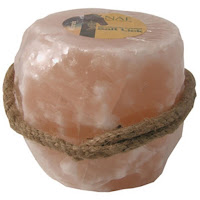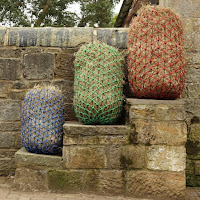The basic rule of thumb for feeding horses is to balance the energy that goes in (in the form of calories) with the energy that goes out (in the form of work and body heat).
This is easier said than done, especially in the winter months, when many horses are idle and stabled for long periods. Even those kept outside through the winter are denied the nutritious grazing of the warmer months.
So, its down to you, the horse owner, to monitor your horse's diet and adapt it according to need, adding hard feed and supplements to the staple forage where necessary in the bleak winter months. Failing to compensate for the natural seasonal availability of forage not only affects your horse's weight and condition, but also his temperament.
HAY THERE!
Fibre is vital - at best your horse should be eating at least 1.5% of his body weight in fibre a day to maintain a healthy digestive system. In cold weather he'll be burning up even more of this essential fuel to keep warm. The most important requirement for winter is therefore a plentiful supply of hay or haylage to make up for depleted grazing, whether he is kept in or out, and whether rugged or not.
If you feed hay in the field, it's best to make it available in a feeder which keeps it off of the ground, out of the wet and mud. Indoors hay nets can provide a much-needed diversion for bored horses, along with some nutritious (and fibre-filled) treats like carrots and apples hidden away to forage for.
A BIT OF THE HARD STUFF
At the start of winter your horse or pony would be best carrying a little extra weight so he can afford to shed a bit, as he is naturally designed to do. Keeping a check on his weight and condition is made more difficult by his shaggy winter coat and warm rugs, which could disguise too much weight loss. Use a weight-tape periodically to pick up any changes, and the tried and trusted method of running your hand over his ribs - you should be able to just feel them.
Most healthy horses will get through the winter on forage alone, but if your horse loses too much weight, his body will use up even more stored fat to compensate: he'll need concentrated (hard) feed for more energy. The same applies to horses who continue to work during the winter. While their energy output for working may not change, they will be using up extra reserves to compensate for the cold weather, so will need extra calorific hard feed input.
Deciding on what, and how much, hard feed to give your horse is tricky - there's always the danger of overdoing it! There are numerous factors to consider such as the breed, age and general condition of the horse or pony. If in doubt consult your vet or an equine nutritionist for expert advice.
There are many commercial ready-mixed hard feed supplements available, designed to suit the different calorie requirements of horses and ponies that need fattening up.
Individual ingredients of these high energy supplements include things like oats, barley, maize, Linseed, chaff, bran and sugar beet. It's best not to mix your own combinations, because assessing the amount required is difficult. Too much of some of these can cause problems, such as oats which might make a horse overly exuberant, or sugarbeet which if not properly prepared can swell in the stomach.
WATER, WATER EVERYWHERE
Winter may be wet, but don't let this fool you into thinking your horse does not need as much to drink as he does in the heat of summer. His water requirements will, in fact, be more, because he is eating dry food like hay, rather than juicy grass.
Take care that water left for the horse does not freeze so he is unable to drink it. Even a few hours without water could cause dehydration. Horses don't like to drink water that is too cold, so top up the water bucket with warm water frequently. If your horse takes in insufficient water there is the risk of impaction colic.
Salt licks should be available to keep electrolytes balanced and help stimulate thirst.
 |
| Himalayan Salt Lick TopSpec Topical Tip Horrendous rain is lashing Scotland and the North, and forecast to soak the UK over the next few days. No doubt more will follow. However grass is still growing and plentiful in most areas, so owners understandably want to make the most of ‘free’ calories. One of the commonest problems encountered in these conditions is horses biting or chewing soil or wood (usually fencing) this should not be confused with regular stereotypical behaviour. Faced with wet grazing, horses often seek crunchy high-fibre e.g. wood or soil. One solution is to provide a large, dead and leafless tree branch (not sycamore or oak) in the horse’s field so that he can chew the bark. Another possibility is to put out into the field 1-2kg (approximately ½-1 flap of a small bale) of dry, clean straw (or hay if he is underweight) per horse. Horses will clear this up. Finally, and probably most conveniently, put out a similar weight of straw chop e.g. TopChop Zero (if the horse is overweight) or grass chop e.g. TopChop Grass (if the horse is underweight). Adjust how much crunchy, high-fibre forage you put out to appetite so that it is cleaned up daily. |




